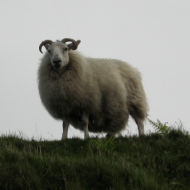
Vets urged to work closely with farmers to tailor farm health and welfare plans
The castration of rams should only be carried out as a last resort to help improve animal welfare standards, according to leading vets.
In a new position statement, the British Veterinary Association (BVA) and Sheep Veterinary Association (SVS) say that, in the absence of licensed local anaesthesia and analgesia products in the UK, efforts should be made to reduce the need for painful husbandry procedures.
Both organisations are calling on vets to work closely with farmers to tailor their farm animal health and welfare plans to reduce the need for castration.
“We know anecdotally that a number of farmers are successfully reducing these procedures in their flocks by using alternative measures,” commented BVA junior vice president and large animal vet, James Russell. “It is about striking a balance between a need for procedures such as these and the potential for them to cause pain.
“Recognising the devastating health and welfare implications of flystrike, BVA and SVS recommend preventive strategies to minimise this condition as well as ways to reduce the welfare risks associated with the act of tail-docking.”
He continued: “Examples include making sure that the procedure occurs after ewe and lamb bonds have been established to avoid ‘mis-mothering’. As with any intervention, tail docking should only occur after it is agreed under a Veterinary Flock Health Plan.”
SVS president, Nick Hart added: “The awareness and implementation of welfare improvements should underpin all aspects of sheep farming. As an association, it is entirely appropriate for us to question practices that impact upon welfare especially when we consider the large numbers of individual animals that are affected.
“With the evolution of our understanding of welfare, we believe that discussion between the farm vet and the farmer is essential in formulating the management of the castration of lambs and the removal of tails. However, the limitations on the availability of licensed products to minimise the discomfort that can occur due to these procedures make this policy aspirational.”
The new position statement forms part of the Animal Welfare Strategy, a BVA framework designed to help vets advocate better animal welfare outcomes.
James Russell said: “It has been great to work with the divisional specialists to shine a spotlight on sheep with the hope that we can help navigate some of the welfare implications associated with routine procedures such as castration and tail docking and, ultimately reduce their use.
“In no way would we want to be seen to tell the farming community how to do their job but instead encourage vets to work really closely with farmers on their animal health and welfare management plans. That helps us to consider all of the options out there and frame castration and tail-docking as the serious procedures that they are, meaning that they are used as more of a last resort, rather than first.”



 RCVS Knowledge has welcomed Professor Peter Cockcroft as editor-in-chief for Veterinary Evidence.
RCVS Knowledge has welcomed Professor Peter Cockcroft as editor-in-chief for Veterinary Evidence.